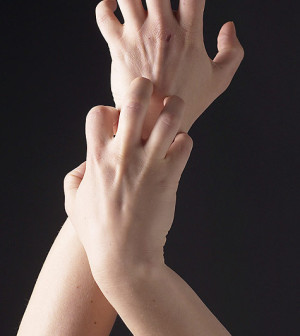- Double Mastectomy May Offer No Survival Benefit to Women With Breast Cancer
- Toxic Lead Found in Cinnamon Product, FDA Says
- Certain Abbott Blood Sugar Monitors May Give Incorrect Readings
- Athletes Can Expect High Ozone, Pollen Counts for Paris Olympics
- Fake Oxycontin Pills Widespread and Potentially Deadly: Report
- Shingles Vaccine Could Lower Dementia Risk
- Your Odds for Accidental Gun Death Rise Greatly in Certain States
- Kids From Poorer Families Less Likely to Survive Cancer
- Tough Workouts Won’t Trigger Cardiac Arrest in Folks With Long QT Syndrome
- At-Home Colon Cancer Test Can Save Lives
Burn Injuries More Common in Summer


Burn injuries increase in the summer as people gather around fire pits, campfires and outdoor grills, say burn experts. Among those most vulnerable to these seasonal fire hazards: children.
“Young children are among the most vulnerable and often get burned by putting their hands on the side of cooking grills,” Dr. Richard Gamelli, director of the burn unit at Loyola University Medical Center in Maywood, Ill., said in a Loyola news release.
“The old adage of ‘When you play with fire, you get burned’ is true — you must always be very serious and attentive when fire is involved. Injuries due to fire happen easily and fast, especially when children are involved or alcohol has been abused,” added Gamelli.
“Children should be kept well away at all times from the cooking area and always be watched closely even after the cooking is done — the grill is still hot,” said Gamelli.
Campfires can also remain hot and smolder long after campers think it has been extinguished, Gamelli added. “At Loyola, we have had patients who got burned after contact with a log from the previous night’s fire, thinking the fire was out,” he said. “Fire can burn for hours after ignition, and the temperature can remain dangerously hot.”
To avoid serious burns among children and adults during summer activities, Gamelli provided the following safety tips:
- Supervise anything that burns.
- Keep children and pets a safe distance from recreational fires and cooking areas.
- Fire pits, campfires and barbecues should be placed in open spaces away from any walls, fences or other flammable structures.
- Never build a fire or barbecue inside a garage or breezeway, or under a carport, porch or covered deck that can catch fire.
- Have a fire extinguisher readily available and know how to use it.
- Don’t drink alcohol around a fire.
- Use a metal cover over a burning fire pit to contain embers.
- Never leave a fire unattended.
- Do not touch or kick coals and logs after a fire is out. Since they can stay hot for a long time, cover these materials to prevent any accidental burns.
- Seek immediate attention if you or anyone with you is burned.
More information
The U.S. National Wildlife Federation provides more on campfire safety.
Source: HealthDay
Copyright © 2024 HealthDay. All rights reserved.










